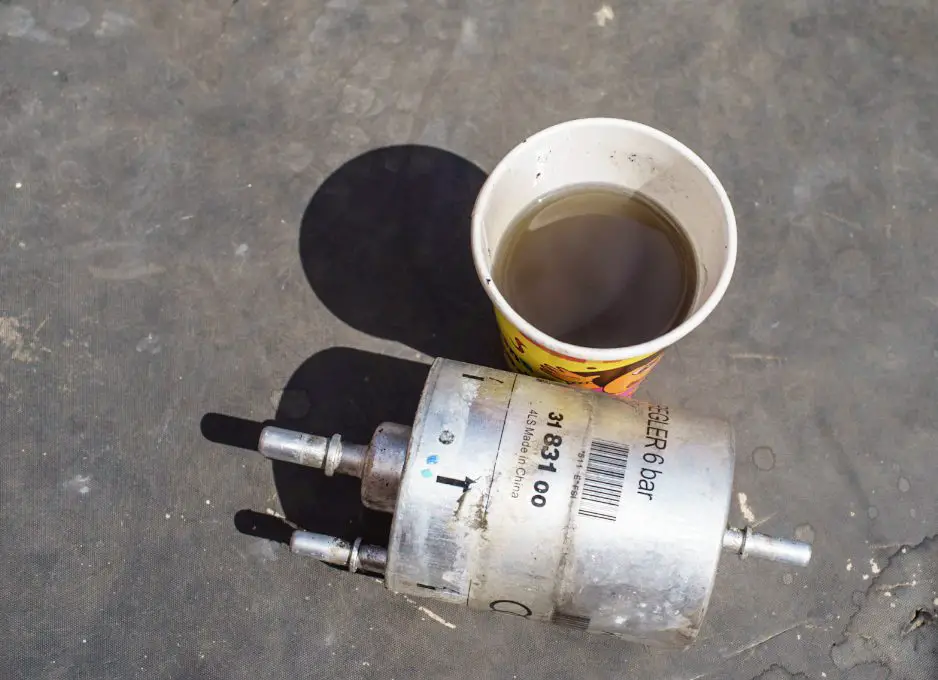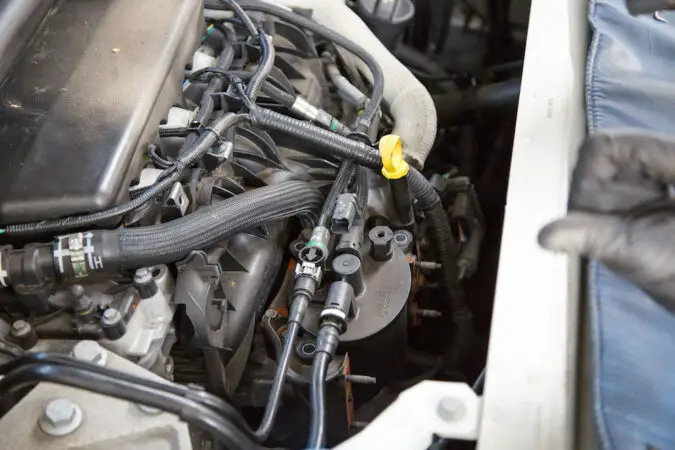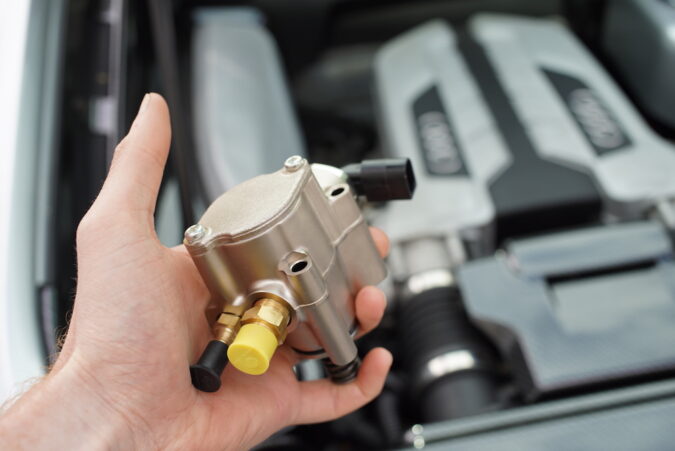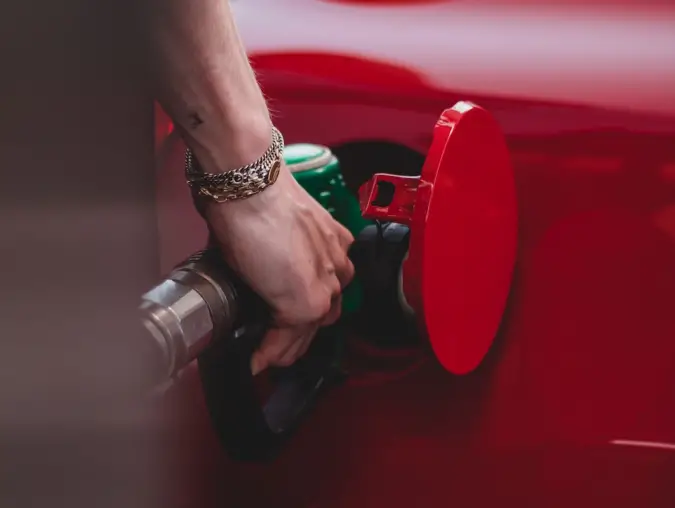If you don’t want to be the guy blowing thick smoke at the traffic light, make it a priority to clean your car’s fuel system. Cleaning your car’s innards will bring back its shine. But how much does it cost to clean a fuel system?
The lean fuel system cost would be around $20 to $1000 or more, depending on the cleaning type and the mechanic who performs the service. If you do not clean your fuel systems in the last 50,000 miles, the buildup will be significant and requires thorough cleaning. The technician will charge more.
Cleaning a fuel system is necessary for the best engine performance, but most car owners do not know when or how to get it done. Let’s get into the details of cleaning the fuel system, the types of cleaning methods, and their cost.
Fuel System Cleaning
A fuel system cleaning is a special treatment that removes deposits from your vehicle’s fuel system and intake valves. A clogged or dirty fuel system can cause acceleration, power, and engine starting problems.
Fuel systems are designed to keep fuel flowing smoothly through the engine and into the combustion chamber. Over time, deposits build up in the tank, pipes, and injectors. This causes trouble getting fuel to where it needs to go and causes poor performance or even stalling.
Cleaning the fuel system removes these deposits and restores normal operation. Regular maintenance is, therefore, essential if you want to avoid expensive repairs later on down the line.
Fuel Injector Cleaning
Fuel injectors are responsible for spraying fuel into the engine at the right time and in the right amount. It is an electronic valve that opens and closes many times per second.
As pressurized fuel comes from the fuel pump, the injectors spray it to mix with air and enter the combustion chamber. When fuel injectors aren’t clean, they may spray too much or too little fuel into your engine, which may cause your vehicle’s engine to misfire.
There are different methods for cleaning fuel injectors, and your choice depends on your budget and the condition of the injectors. While you can clean some fuel injectors with fuel injector cleaners, others require special chemicals.
Clean Fuel System Cost, Methods: #1. Using Fuel System Cleaners
This method uses a good quality fuel injector cleaner. The procedure involves pouring the cleaner into the fuel tank and running the car on idle for a couple of minutes. While this happens, the cleaner breaks down deposits into tiny particles that can burn in the engine.
Fuel system cleaners are designed to dissolve carbon and dirt buildup in the fuel system and flush it out through the exhaust system. They contain detergent to help remove deposits inside your engine’s cylinders and combustion chambers. The main ingredient in these cleaners is polyetheramine, PEA.
Because of their surface-active nature, PEA detergents work better than other forms of fuel-additive detergents. Lower-quality injector cleaners don’t break down deposits adequately, which can jam injectors and become trapped in catalysts and exhaust valve seats.
Clean Fuel System Cost, Methods: #2. Rail-Induced Injector Cleaning
Rail-induced injector cleaning is a process that utilizes the rail pressure to remove any carbon buildup from inside the injectors. The injector tool is inserted into the fuel rail, and an air compressor creates pressure on the cleaner to flush out contaminants in the system. You should let a professional perform this process.
Clean Fuel System Cost, Methods: #3. DIY Injector Cleaning
This involves removing the fuel injectors and cleaning them individually. You can achieve this with a fuel injector cleaner, a 9V battery, and electrical clips.
Clean Fuel System Cost, Methods: #4. Ultrasonic Fuel Injector Cleaning
In ultrasonic cleaning, high-frequency sound waves are sent via a cleaning solution. The sound waves produced by this frequency leave behind micron-sized, superheated bubbles.
The bubbles collide with the walls of the fuel injector and generate heat and energy. A combination of the heat and cleaning solution produces a scrubbing action that cleanses the fuel injector.
Gas Treatment For Cars
Gas treatments are additives that improve fuel quality and increase engine performance and mileage. There are different types of gas treatments for different needs. For example, carbon deposit cleaning dissolves carbon deposits in your vehicle’s fuel system, while octane boosters improve fuel quality.
Clean Fuel System Cost, Gas Treatment: #1. Fuel Stabilizers
Fuel stabilizers compose of a blend of chemicals that reduce the formation of acids, prevent oxidation, and help preserve the quality of your fuel. They’re designed to be used before storage and can be added directly to your tank or used as a pre-treatment additive in your fuel tank.
Clean Fuel System Cost, Gas Treatment: #2. Octane Boosters
Octane booster is a fuel additive added to gasoline or diesel to increase the fuel’s octane rating. The higher the octane rating, the more compression it can withstand before detonating prematurely. They also reduce knock on engines by increasing the fuel’s octane rating.
The primary function of an octane booster is to increase engine performance by increasing its resistance to detonation. It’s commonly used on sports cars with engines modified with higher compression ratios.
Clean Fuel System Cost, Gas Treatment: #3. Fuel Injector Cleaners
The fuel injector cleaners dissolve carbon deposits and other contaminants that may have accumulated in your car’s fuel system. There are plenty of fuel injector cleaners in the market, but PEA cleaners are the most effective.
Note: When using these treatments, you must consider your car type. Octane boosters are for turbocharged or supercharged high-horsepower engines. Stabilizers prevent oxidation reactions when fuel stays in your car tank for a while.
Fuel System Service
A fuel system service is a routine check of your vehicle’s fuel system. The service includes cleaning injectors, pumps, intake valves, and carburetors. It also involves replacing damaged parts like the fuel filters and valves.
Fuel lines are made of rubber and can become brittle over time. They can also crack or tear if they’re kinked or pinched under pressure. A small leak in a line can mean a big problem because that leak will cause you to lose valuable fuel.
During a fuel system service, the mechanic will:
- Remove carbon deposits in the intakes and manifold.
- Clean the exhaust valves of buildup.
- Clean the catalytic converter and oxygen sensor.
- Clean the pistons and combustion chamber.
- Clean the idle bypass circuits and throttle plate.
- Change the fuel filter.
- Check for leaks in the fuel line system.
- Adjust the carburetor settings.
Unless they show symptoms of wear, you do not need to change your fuel pumps and injectors. A fuel injector cleaning may sometimes be a waste of money, especially if it is not listed in your owner’s handbook and you own a newer, more complicated model.
Cost Of Fuel System Cleaning
It’ll cost you $20 to $1000 to clean your car’s fuel system, although this price depends on the cleaning required. Ultrasonic cleaning is more rigorous and costs more than rail-induced cleaning. If you do it yourself, you only need to get a cleaner; $10 might be enough.
Another factor that influences the cost of fuel system cleaning is the mechanic handling the cleaning. Some professionals tend to charge more for cleaning fuel systems, so do proper research before hiring one.
Fuel Line Cleaning
The fuel lines in your vehicle carry the fuel from your tank to the engine. If you can imagine a straw with water in it, this is how your fuel lines work. The only difference is that gasoline and diesel are used instead of water.
Fuel lines are made up of many components, including filters and pumps. All of these components can get dirty over time, which will cause problems with your fuel system.
If the fuel line gets clogged, it may cause a lack of power in your car or truck. This can happen when you’re driving or idling at a stoplight, which causes your vehicle to stall. A fuel line cleaning will restore the gas flow through your vehicle’s fuel system.
Fuel System Cleaner Worth It
A good fuel system cleaner is worth it; your engines will thank you. They remove carbon deposits from your vehicle’s fuel system by dissolving them into tiny particles that burn with fuel and exit through the exhaust chambers. Regular use keeps your car engine healthy.
The main ingredients in fuel system cleaners are polyisobutene, PIB, polyisobutylene amine, PIBA, and polyetheramine, PEA. They are all detergents that break down carbon buildup, but PEA is the most effective. PEA is stable enough to remove carbon deposits under high temperatures.
PIB is a common ingredient in fuel injectors and carburetor cleaners. Using the right dose can prevent new carbon deposits from forming but can’t remove the old ones.
PIBA works better than PIB in removing deposits and preventing further buildup in fuel injector cleaners. But PIBA is not very stable and hence can’t survive the heat in the combustion chamber; it evaporates before getting the job done. It’s perfect for cleaning fuel injectors and cylinder heads.
Fuel System Flush
The fuel system flush is a service you can perform to clean your vehicle’s fuel lines. This is usually done to remove any deposits that may have built up over time. Over time, gasoline can become contaminated with dirt or gunk from the engine or exhaust system. This affects how well the fuel burns in your engine, leading to reduced power and efficiency and increased emissions.
Fuel system flush helps to improve the overall quality of your vehicle’s fuel by removing any deposits that may have built up over time. It can help increase your vehicle’s MPG by ensuring that all parts operate at optimum levels.
Most mechanics use a three-step procedure to flush the fuel system:
- Adding the fuel system cleaner and let the engine run for 15 minutes.
- Mix a highly concentrated cleaner with gasoline and pour it into a flushing cylinder that helps pressurize the contents.
- Turn off the fuel pump and connect the flushing cylinder after 15 minutes of idling. Crank the engine, and the cleaner mix flows through the fuel lines cleaning the injector.
Complete Fuel System Cleaning
A complete fuel system cleaning is an automotive maintenance service that cleans the entire fuel system, including the fuel tank, fuel lines, injectors, intake valves, and combustion chamber. Carbon deposits build up in your gasoline tank, on your fuel injectors, in your fuel lines, or at the intake or filter of your fuel pump.
During a complete fuel system cleaning, you should chemically clean the fuel system to eliminate any deposits that may have built up over time. The mechanic will replace the fuel injector, fuel filters, and pump if necessary.
Fuel Injection Repair Cost
On average, repairing your car fuel injector should cost between $800 to $1,450 for parts and labor. The price depends on the make and model of your car and the repair shop you chose. Luxury cars typically have costly repairs, while regular cars have cheaper repairs. For more insight, check out our write-up on what do fuel injectors do.
Each cylinder in your car engine has a fuel injector. If one of them cracks, you may have to replace all because what made one crack could damage all. Instead of trying to save money by replacing the faulty injector, have the mechanic change all of them and prevent recurring damage to the fuel system. Besides, you’ll pay the same labor charge if you replace one.
Fuel Injectors Replacement Cost
You can get one fuel injector for $200 and have a mechanic replace it. If you have a four-cylinder car, you’d need four fuel injectors bringing the cost to about $800. On average, the labor cost for replacing fuel injectors is between $180 and $230.
Sometimes the parts cost more than labor, depending on what type you choose. OEM parts tend to cost more and have superior quality than the more budget-friendly aftermarket parts. If you own a regular vehicle, you shouldn’t spend more than $1200 on fuel injector replacement.
Fuel Injector Cleaning Service Cost
A fuel injector cleaning service can cost between $60 to $100, depending on the cleaning method. Professionals will charge more for a thorough cleanse, especially if you haven’t cleaned the injector in a long time. If you do it yourself, you’ll spend less.
DIY fuel injector cleaning works but is not like professional cleaning services. If you’re doing it yourself, you’ll use fuel injector cleaners, while professionals usually add a concentrated cleaner to the procedure. They may also inspect the parts if you want a full cleaning service.
How To Clean Fuel Injectors At Home
To clean fuel injectors at home, you’ll need:
- Fuel injector cleaner
- Electrical clips
- 9V battery
- Removal tool
- Tire valve or hose
- Electrical tape
Clean Fuel System Cost, Fuel Injector DIY Cleaning Procedure:
- Disconnect the fuel pump from the injectors and remove the injectors.
- Remove the O-rings and pintle caps from the fuel injector. If they’re worn out, replace them with new ones when done.
- Use a removal tool to remove the core of the tire valve.
- Take the straw off the cleaner container and wrap one end with electrical tape to fit the tire valve stem. Using a hose, you’ll need to wrap more tape so the straw fits.
- Fit the other end of the valve to the injector nozzle.
- Hook the positive and negative terminals of the electrical clips to the corresponding terminals on the battery.
- Fit the other end of the straw into the spray nozzle of the cleaner.
- To clean, spray the cleaner while touching the electrical contacts on the injector with the electrical clips.
- Do this until the liquid flowing from the injector nozzle is clear.
FAQs On Clean Fuel System Cost
How To Clean Dirty Fuel Injectors
To clean dirty fuel injectors using a spray cleaner, disconnect the fuel pump from the injectors and clean their outer part with a soft bristle brush. Insert the straw into a tire valve and put the other end of the straw into the spray nozzle. Insert the injector into the tire valve, and use a 9V battery as a jumper to the electrical contacts on the injectors. Spray the cleaner while touching the injector’s connections with the wire terminals to clean.
What Does Fuel Injector Cleaner Do
Fuel injector cleaner dissolves carbon deposits in the fuel injectors and flushes them off. They’re made of special detergents that can break down carbon buildup into particles that mix with fuel, burn, and are eliminated through the exhaust. Good fuel injector cleaners like PEA also prevent further buildup.
How Much To Replace A Fuel Injector
Replacing a fuel injector costs between $200 to $450 for parts and labor. This price depends on the number of injectors and the type of parts. Usually, fuel injectors are replaced together, even if just one is faulty. You can budget $1200 for a four-cylinder vehicle with four injectors. Also, OEM parts cost more than aftermarket options, so the cost of getting new fuel injectors varies.
What Is Fuel Injector Service
Fuel injector service is a car maintenance service that involves passing a cleansing liquid through the fuel injectors to remove carbon buildup, sediment, and gum. The detergents in the cleaner dissolve carbon deposits, so they pass out with the cleaner. Usually, the mechanic inspects the injectors, O-rings, and pintle caps if necessary.
How To Unclog A Fuel Injector
If your vehicle’s fuel injectors are clogged, you need to flush them using a fuel injector cleaner or carburetor cleaner. To do this, fit the straw into the spray nozzle and insert the other end of the straw into a tire valve. Clamp the injector and insert it into the tire valve. Use a simple jumper like a 9V battery to energize the injector while spraying the cleaner. Do this until a clear liquid flows out of the injector nozzle.
How Much Is A Fuel Injection Cleaning
Cleaning a fuel injector costs $10 to 100$, depending on the cleaning method. If you clean the fuel injectors at home, $10 is enough, but if you’re hiring a professional, you could spend up to $100. Professional cleaning services could involve inspecting and replacing parts where necessary.
Can You Clean A Fuel Injector
You can clean a car fuel injector at home or take it to a professional. Mechanics often pour the injector cleaner into the fuel tank and idle the vehicle for 15 minutes. They finish the process by using a concentrated cleaner in a flushing cylinder to give the fuel lines a final rinse.
How Often To Clean Fuel Injectors
You should clean fuel injectors after 30,000 miles or as specified in your vehicle’s manual. Old cars (built before 2004) are prone to dirty fuel injectors, so you may have to clean them more often to avoid low engine performance and emissions. If you’ve noticed unusual emissions from your vehicle shortly after cleaning the injectors, the culprit may not be clogged but worn injectors that need to be replaced.
What Is Fuel System Cleaning
Fuel system cleaning is a procedure for cleaning car fuel injectors, fuel pumps, intake valves, and carburetors. A fuel system cleaner is administered through the fuel tank. The cleaner flows through fuel lines with the fuel dissolving carbon deposits. It burns with fuel and leaves through the exhaust. The procedure keeps the engine healthy and prevents breakdowns.
Is Fuel System Cleaner Worth It
A fuel system cleaner not only dissolves carbon deposits in the fuel system but also prevents new deposits, so it’s worth it. Fuel system cleaners contain detergents like PIB, PIBA, and PEA. These substances break down carbon deposits in the fuel system into particles that can burn with the fuel and leave through the exhaust.
How To Fix Dirty Fuel Injectors
To fix dirty fuel injectors, purchase a fuel injector kit that includes a PEA cleaner and a hose. Check your vehicle’s manual for the engine layout and disconnect the fuel rail and pressure line. Fill the cleaning tool with the cleaner and hook it to the hood. Remove the cap on the fuel tank and remove the fuel pump relay in the fuse box. Connect the cleaning tool to the fuel rail and air compressor to the air intake on the cleaning tool and set the pressure to about 45 PSI. Start the car and allow it to idle till the cleaning liquid is spent.
Is Fuel Injector Cleaning Service Necessary
A fuel injector cleaning service is necessary for your engine to perform at its best. When carbon deposits from fuel settle in the fuel injector, it causes the fuel injector to spray an inadequate amount of fuel; hence combustion will not be smooth. Consequently, the engine will underperform. Cleaning the fuel injectors as specified in the car manual prolongs the engine’s life span.
Conclusion On Clean Fuel System Cost
A clean fuel system preserves the car engine by regulating fuel inflow adequately. When left dirty or clogged, it can cause poor emissions, and you have to fix it. Clean fuel system cost $20 or $1000 depending on the cleaning procedure. If you want ultrasonic cleaning, be ready to spend or save a few dollars and do it yourself.




